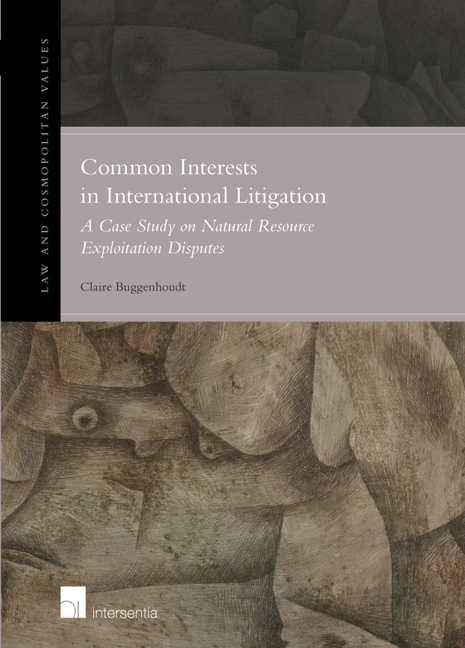Book contents
- Frontmatter
- Acknowledgements
- Contents
- Table of Cases
- List of Abbreviations
- Chapter 1 Introduction and Research Design
- Chapter 2 Procedural Considerations and Common Interests
- Chapter 3 Substantive Considerations and Common Interests
- Chapter 4 A Common Approach to Common Interests
- Chapter 5 General Conclusion
- Bibliography
- Index
- Law and Cosmopolitan Values
Chapter 2 - Procedural Considerations and Common Interests
Published online by Cambridge University Press: 27 September 2018
- Frontmatter
- Acknowledgements
- Contents
- Table of Cases
- List of Abbreviations
- Chapter 1 Introduction and Research Design
- Chapter 2 Procedural Considerations and Common Interests
- Chapter 3 Substantive Considerations and Common Interests
- Chapter 4 A Common Approach to Common Interests
- Chapter 5 General Conclusion
- Bibliography
- Index
- Law and Cosmopolitan Values
Summary
INTRODUCTION
The procedure of an international court or tribunal is stipulated in its constitutive Treaty and elaborated in the relevant Statute or rules of procedure. At the procedural stage, the role of the judicial body therefore seems limited to applying those rules to which the parties consented (as a mere bouche de la loi) and it may be questioned whether the discussed ‘emergence of the common interest’ could be reflected in the decision-making process at this stage of the proceedings. However, closer examination shows that, in general, the procedural rules of international courts and tribunals oft en (purposely) leave gaps or only include minimal provisions that leave much room for interpretation. Furthermore, most statutes expressly provide that the relevant international court or tribunal has the power to determine its own rules of procedure and to make procedural orders. Thus, in most instances, the State parties have little to no impact on the specific content of the procedural decisions made by international courts and tribunals.
When interpreting the broad procedural rules provided by the State parties, judicial bodies use different techniques that oft en have a ‘harmonizing effect’ on the procedures of the different courts and tribunals. Thus, although the impact of the emerging common interest concept on the procedure of the international courts and tribunals has not sparked much interest, there is a large margin of discretion at this stage and a clear cross-fertilisation of jurisprudence, making the interpretation of procedural rules even more interesting in the context of the proliferation of international courts and tribunals. This chapter will examine whether the selected judicial bodies provide openings to common interests in their procedure. It will focus on five types of procedural decisions, in order of appearance: decisions on jurisdiction, standing, evidence, third party interventions and provisional measures. Only a selection of judicial bodies will be studied for each procedural issue. This selection was made on the basis of the availability of case law that shows a link with both natural resource exploitation and common interests.
JURISDICTION
The first hurdle to overcome in bringing a case before an international court or tribunal is establishing that the judicial body approached has jurisdiction, that it has the right to interpret and apply the law.
- Type
- Chapter
- Information
- Common Interests in International LitigationA Case Study on Natural Resource Exploitation Disputes, pp. 31 - 80Publisher: IntersentiaPrint publication year: 2017



